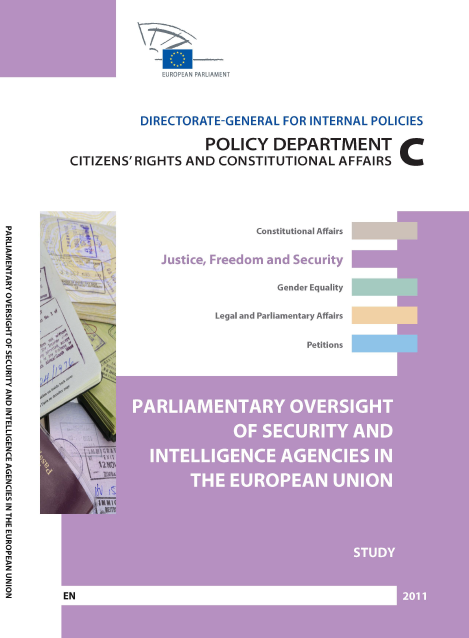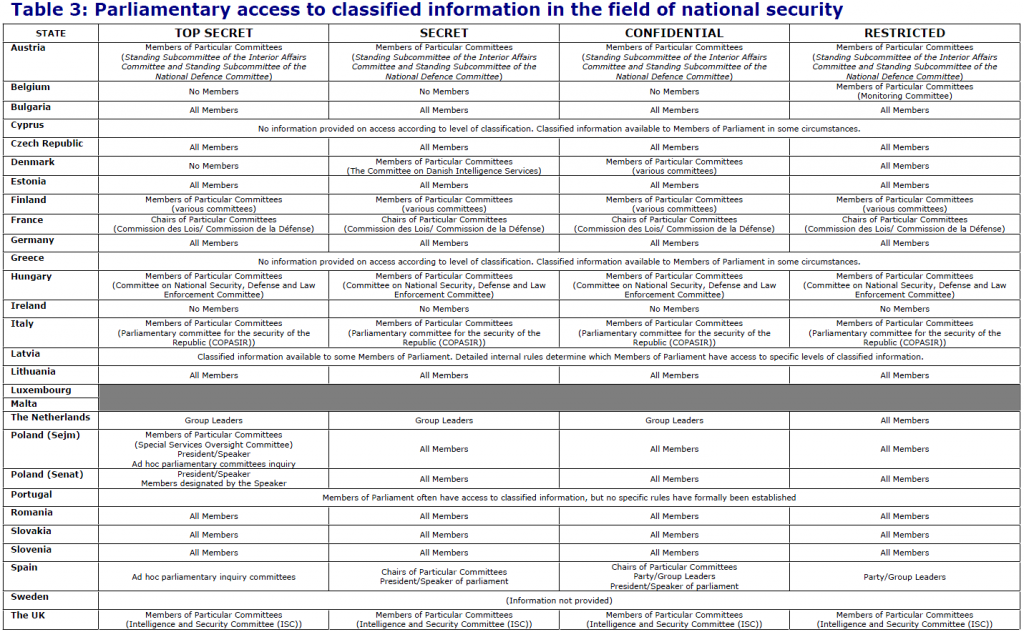PARLIAMENTARY OVERSIGHT OF SECURITY AND INTELLIGENCE AGENCIES IN THE EUROPEAN UNION
- 446 pages
- June 2011
This study evaluates the oversight of national security and intelligence agencies by parliaments and specialised non-parliamentary oversight bodies, with a view to identifying good practices that can inform the European Parliament’s approach to strengthening the oversight of Europol, Eurojust, Frontex and, to a lesser extent, Sitcen. The study puts forward a series of detailed recommendations (including in the field of access to classified information) that are formulated on the basis of in-depth assessments of: (1) the current functions and powers of these four bodies; (2) existing arrangements for the oversight of these bodies by the European Parliament, the Joint Supervisory Bodies and national parliaments; and (3) the legal and institutional frameworks for parliamentary and specialised oversight of security and intelligence agencies in EU Member States and other major democracies.
…
Access to and the protection of classified information by the European Parliament
As this study’s analysis of oversight of intelligence agencies at the national level demonstrates, information is the oxygen that sustains oversight; a mandate to oversee an agency’s work is of limited use unless it is accompanied by access to the relevant information. It will be extremely difficult to strengthen parliamentary oversight of the AFSJ bodies without clear and predictable rules and procedures for the EP to access relevant information from these bodies, the Commission and the Council. While access to relevant information is fundamental to oversight, the professional handling of this information by overseers is also crucial for effective oversight. Accordingly, improved access to classified information by the EP will need to be accompanied by the development of appropriate procedures for the protection of this information, as well as an ongoing commitment from MEPs to handle classified information in a professional manner.
Improving the European Parliament’s access to classified information in the AFSJ
The development of an appropriate legal and institutional framework for parliamentary access to classified information is of fundamental importance to strengthening the EP’s oversight of the AFSJ bodies. The discussion of the EP’s access to classified information must take place alongside deliberations on the evolution of the EP’s mandate to oversee the AFSJ bodies; indeed, we have argued throughout this study that an oversight body’s information needs are inextricably linked to its mandate. Yet, regardless of which aspects of the AFSJ bodies’ work the EP wishes to oversee and which institutional mechanism is chosen to carry out this oversight (see below for a discussion of these mechanisms), access to relevant classified information will be crucial. This is because various aspects of the work of AFSJ bodies are classified and/or involve the processing or creation of classified information.
Parliamentary access to classified information is currently being discussed in the context of deliberations regarding the revision of Regulation 1049—legislation which is ostensibly about public access to information from EU entities. The EP’s rapporteur on this matter, Michael Cashman, has opted to include provisions on parliamentary access to information in the broader draft legal framework for public access to EU documents. This approach has several advantages. First, it is aimed at ensuring that there is a general framework for the EP’s access to classified information from all EU entities and across all policy domains. This may be preferable to a fragmented legal framework for parliamentary access to information based on inter-institutional agreements across different fields. The effects of this current framework are that the EP has access to classified information from, e.g., the Council, in some fields but not others and that different modalities apply to access classified information in different policy domains. Second, the inclusion of provisions on the EP’s access to classified information as part of broader legislation on public access to information could help to ensure that these rules have the status of legislation rather than being enshrined in inter-institutional agreements, which are of a subordinate legal status. In spite of these advantages, we are of the view that parliamentary access to classified information should be decoupled from provisions on public access to information. This is supported by practice on the national level, where freedom of/access to information laws are separated entirely from regulations on parliamentary access to information. Parliamentary access to classified information implies access to the specific categories of information which are justifiably exempt from public access, e.g., information regarding the work of intelligence agencies. It is precisely because such information is beyond the reach of public access that it must be available to certain parliamentarians and institutions established by parliaments for overseeing, inter alia, intelligence agencies. In almost every state analysed in this study, parliaments have privileged access to classified information to, among other things, enable to them oversee intelligence activities. This is premised on the notion that parliamentarians are elected by a population to hold governments and their agencies to account. In order to do this, they require privileged access to information which is not necessarily available to members of the public. Therefore, rules governing parliamentary access to classified information are set out in law and are disconnected for general freedom of/access to information laws.
Recommendation 11: New regulations on the European Parliament’s access to classified information should be decoupled from legislation on public access to information.
…
4.1.1. The rationale for oversight of intelligence agencies
Many states created parliamentary and other specialised bodies to oversee intelligence agencies in light of revelations about their involvement in illegal and/or improper activities, e.g., Canada, the Czech Republic, Norway, Poland, South Africa, and the US. Notably, during or immediately after the Cold War, it became clear that in many Western states, governments had used intelligence agencies to surveil and disrupt persons involved in legitimate expressions of the rights to freedom of association, assembly and expression. Elsewhere, intelligence agencies were found to have exceeded their legal mandates and powers in tackling domestic terrorism. Perhaps the egregious violations of human rights by intelligence agencies took place in communist/authoritarian regimes, where intelligence agencies were an integral part of the repressive state apparatuses which permeated all areas of society. Against this backdrop, effective oversight (and legal regulation) of intelligence agencies came to be seen as essential for ensuring that they contribute to the security of the populations they serve without undermining democratic processes and human rights. That is, to ‘secure democracy against internal and external enemies without destroying democracy in the process’. Needless to say, the development of oversight of the EU’s AFSJ bodies is taking place in a vastly different climate from the types of conditions that led to the establishment of oversight bodies on the national level. Arguments for robust oversight of intelligence agencies can be distilled into five main areas.
First, and perhaps most importantly, the law gives most intelligence agencies powers that permit them to restrict human rights and which, if misused, could result in the violation of human rights. Indeed, as Canada’s Justice O’Connor stated in the Arar Inquiry: ‘national security activities involve the most intrusive powers of the state: electronic surveillance; search, seizure and forfeiture of property; information collection and exchange with domestic and foreign security intelligence and law enforcement agencies; and, potentially, the detention of and prosecution of individuals’. Intelligence agencies are necessarily given a considerable amount of discretion in their use of intelligence collection powers, which increases the scope for such powers to be misused. In view of this, oversight is necessary to help ensure that such powers are used in accordance with national and international law.
Second, on a national level, the political misuse of intelligence agencies has always been a risk, primarily because these agencies can be used to unlawfully gather information about political opponents. Oversight is seen to be an essential safeguard against incumbent governments using intelligence agencies to protect or promote party political interests. This is less of a concern at the EU level because there is not the same direct relationship of control between the executive and the agencies. Perhaps more importantly, the fact that 27 Member States, the Commission and Council are all involved in the political control of these agencies means that there are in-built checks and balances against there (mis)use by any one party or interest group.
Third, the secrecy surrounding national intelligence agencies shields them from the processes of public accountability which apply to public bodies in democracies. For example, these agencies are not usually particularly open with the media and are often exempt from freedom of information legislation. This makes it difficult for the media, civil society organisations and the public more generally to scrutinise the intelligence agencies’ work. This further increases the need for oversight by independent bodies that have access to information not available to the general public.
Fourth, in common with all public bodies, intelligence agencies are funded with public money and should therefore be held to account for their use of this money. There is particular need for oversight given that intelligence agencies are normally authorised to make secret payments to covert agents. The potential for the inappropriate use of money is heightened in this area. Robust oversight is necessary to ensure that intelligence agencies use public money lawfully and efficiently.
Finally, while oversight is often seen as necessary to guard against the misuse of, and abuse by, intelligence agencies, it also helps to ensure that these agencies fulfil their mandates effectively. Intelligence agencies are, inter alia, entrusted with collecting, analysing and disseminating information about very serious threats to national security and public safety, such as terrorism. The executive and other agencies, such as the police, rely on the information provided by intelligence agencies to take action to combat these threats. Failures by intelligence agencies to perform such functions effectively, e.g., by missing information indicating a terrorist attack, can have catastrophic consequences.
Independent oversight of the work of intelligence agencies helps to ensure that they are as effective as possible.


